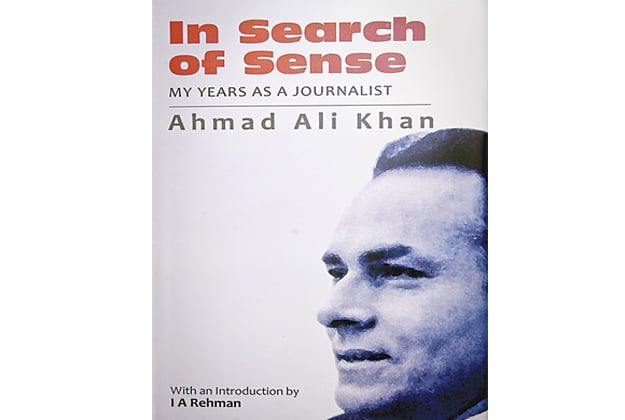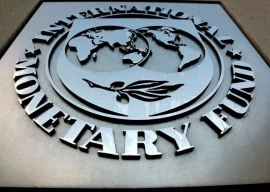
Dr Naveed Ahmad Tahir, the daughter of former Dawn editor Ahmad Ali Khan, said this at a discussion on his autobiography, 'In Search of Sense - My Years as a Journalist', organised by the Readers Club at Defence Central Library on Thursday evening.
Khan had been the editor of Dawn from 1973 to 2000 making him the newspaper's longest-serving editor. After retirement, he started working on his autobiography but could not complete it before his death in 2007. He had written seven chapters. The two remaining chapters were completed by his daughter and the book was published earlier this year. Noted columnist and secretary-general of the Human Rights Commission of Pakistan, IA Rehman, wrote the introduction of the book.
Talking about the challenges she faced while completing his memoir, Tahir said he had left a lot of rough notes and it was quite difficult to select the matter from them to carry the account on from the point where he had left. "I requested journalists who had worked closely with him, including columnist and former assistant editors Zubeida Mustafa and Muhammad Ali Siddiqui, [for help]," she said. The two also accompanied Tahir on stage.

The book also includes some letters that Khan wrote in Urdu to his wife, writer Hajra Masroor, with their translations. Tahir pointed out that her father wrote these letters to his wife for the sake of discipline. The couple lived in the same house but Khan believed in the power of written words. "A written word cannot easily be forgotten," Khan wrote in the book.
"Almost every morning, he would leave a note on the kitchen counter for me since he was in the habit of passing on his thoughts in writing," recalled Tahir. She had been reluctant to include the letters in the book but IA Rehman advised her to include them as they would help readers understand Khan's personality.
"I advised Khan Sahib to use a technique that would not only tell his life's story but also unfold historic events he witnessed throughout his journalistic career," said Siddiqui. "He started the book with Ataturk's death."
According to Mustafa, Khan was a man of principle and integrity. When Khan was appointed as the editor in 1973, he faced immense pressure from the government to either obey their orders or close down, recalled Siddiqui. "Khan Sahib said if the paper will close down, it will be on principles and not on government's orders," he said.
Siddiqui said that Khan not only educated and groomed several journalists but would also tell them how to prepare questions before interviewing anyone. "He used to tell us little things that we never cared about," he shared. "I have copies of those notes for my sons and daughters-in-law. The most difficult thing is to deal with human beings, he told us."
Tahir said that her father believed in human interaction. "I got wisdom from him and I still miss those times," she said. Mustafa added that he was a good teacher and believed in values and ethics of journalism.
At the end of the event, Tahir read out some paragraphs from the book and thought-provoking letters that Khan had written to his wife.
Published in The Express Tribune, September 19th, 2015.






















1716141490-0/image-(28)1716141490-0-270x192.webp)







COMMENTS (1)
Comments are moderated and generally will be posted if they are on-topic and not abusive.
For more information, please see our Comments FAQ